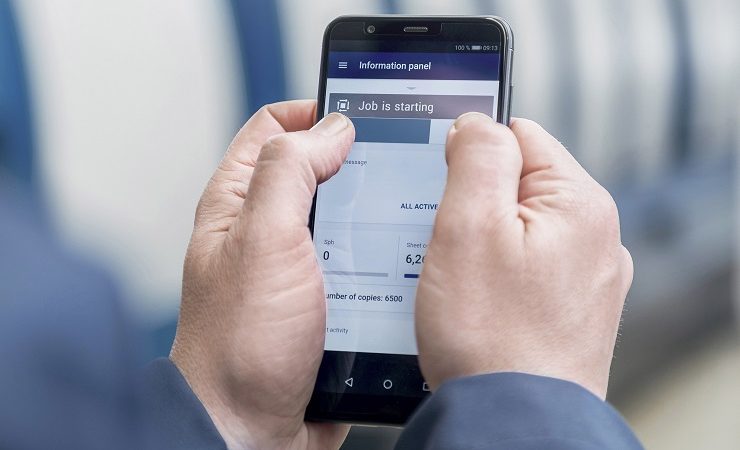Printing equipment manufacturer Koenig & Bauer is seeking to, ‘position ourselves to a greater extent independent of the economy and more competitively for the future,’ according to CEO Claus Bolza-Schünemann.
In detailing its 2019 financial results, the company stated that its focus on packaging, including digital technologies, and work to increase revenue and earnings in this area, has put it on track to reduce dependency on the ‘politically volatile and lumpy’ security printing business.
For Koeing & Bauer, this has included the acquisition of Iberica and Duran, the establishment of a joint venture with Durst, and developing various partnerships in software. This has expanded its portfolio for packaging printing. Customers are now adopting such technology, including Klingele taking a CorruCUT sheet-fed flexo press for analogue direct printing on corrugated board after an extensive and successful test phase for the new technology; and Interprint and Tetra Pak installing RotaJET systems, for digital décor printing and digital full-colour beverage carton printing respectively.
The company’s service initiative, launched in 2016, is also bearing fruit. The service revenue share in the Koenig & Bauer group increased significantly from 25.9% in the previous year to 28.2% in 2019.
Overall, the group’s order intake (€1.14 billion) and order backlog (€534 million) were below the figures for the prior year (€1.22 billion and €611 million). Group revenue remained stable at €1.22 billion.
By segment, in addition to the strong service business, more orders for large- and medium-format presses led to growth in order intake in Sheetfed of 8.9% to €625 million. Compared to 2018, revenue increased by 2.6% to €632 million. A slightly lower order backlog of €183.4 million was down compared to the previous year (€190 million), although Koenig & Bauer said it, ‘remained at a good level.’
In Digital & Web, order intake of €145 million was 18% below the prior year’s figure. In addition to the shrinking web offset service business, lower orders in flexible packaging printing were the main reason for this decline. Revenue increased by 7.4% from €153 million to €165 million. On balance, the order backlog decreased from €86 million to €66 million at the end of 2019.
In the Special segment, order intake of €407 million was below the prior-year’s figure of €505 million, which was impacted by a major order in security printing. After €492 million in the previous year, revenue of €464 million was achieved. Order backlog at the end of 2019 was €287 million versus €345 million
Mr Bolza-Schünemann said, ‘The end markets we address are fundamentally intact with packaging printing showing good structural growth. However, growth requires normal business years. Due to the increasing economic uncertainty, we decided to invest significantly in reducing manufacturing costs and to join forces more strongly within the group. With these measures, we aim to position ourselves to a greater extent independent of the economy and more competitively for the future.’
Dr Andreas Pleßke, management board member responsible for the company’s ‘Performance 2024’, commented, ‘We are currently targeting reducing costs by over €70m by 2024 with one-off costs of €30m to €40m. We expect the package of measures to be expanded further. The focus of the various projects aimed at optimising group-wide structures and processes is on considerably reducing manufacturing costs to achieve a significant improvement in the earnings situation in the new machine business. This includes design-to-cost projects, purchasing optimisations and some further measures. Bundling tasks as shared services as well as the reduction of holding costs and SG&A expenses are also on the agenda.’
Koenig & Bauer chief financial officer Dr Mathias Dähn added, ‘In addition to the cost-cutting projects, the efficiency programme aims to reduce lead times in assembly and accelerate customer acceptance. In addition to shorter delivery times, this will lead to a drop in working capital and a cash flow improvement. Moreover, we work with further activities and a sophisticated controlling of all measures with permanent monitoring on the significant reduction in working capital. We see considerable potential for improvement, particularly in security printing in terms of inventories and receivables through optimised sales management and stepping up export financing. The comprehensive package of measures also aims at a more even distribution of revenue over the year in the Sheetfed segment.’
Mr Dähn continued, ‘Even before the outbreak of the coronavirus, global economic conditions were demanding. Given the daily worsening global economic situation due to the coronavirus, the impacts on our company and the achievement of our planning are currently completely open. For 2020, we are planning to achieve a largely stable group revenue compared to the previous year and the prior year’s EBIT level without the around €10m in special expenses from the efficiency programme. Managing the possible consequences of the corona crisis is currently a top priority.’




